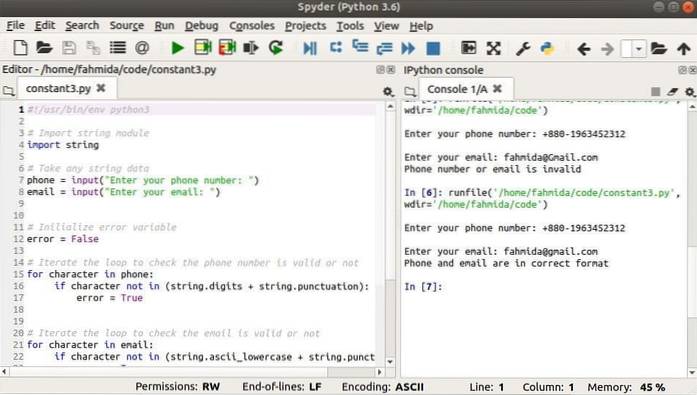- Are there constants in Python?
- What are constants in Python?
- How do you do a constant in Python?
- Why does Python not have constants?
- What is a Python variable?
- How do you declare in Python?
- What is Python literal?
- Is there a #define in Python?
- What are Python functions?
- How many types of literals are allowed in Python?
- How do you declare a final variable in Python?
- What is global variable in python?
Are there constants in Python?
Python doesn't have constants.
What are constants in Python?
A constant is a type of variable whose value cannot be changed. It is helpful to think of constants as containers that hold information which cannot be changed later.
How do you do a constant in Python?
How to Implement Constants in Python
- Use all capital letters in the name: First and foremost, you want your constants to stand out from your variables. ...
- Do not overly abbreviate names: The purpose of a constant — really any variable — is to be referenced later.
Why does Python not have constants?
In Python functions are "call-by-value" but since python variables are references you effectively pass a copy of a reference. ... Therefore, if you pass a number as a variable, it is actually passed "like" a constant. You can assign a new value to the variable. But outside of the function, you still got the old number.
What is a Python variable?
A Python variable is a reserved memory location to store values. In other words, a variable in a python program gives data to the computer for processing.
How do you declare in Python?
How to declare a variable in Python
- The first character of the variable can be an alphabet or (_) underscore.
- Special characters (@, #, %, ^, &, *) should not be used in variable name.
- Variable names are case sensitive. For example - age and AGE are two different variables.
- Reserve words cannot be declared as variables.
What is Python literal?
A literal is a succinct and easily visible way to write a value. ... Some of the choices of types of literals are often integers, floating point, Booleans and character strings. Python support the following literals: String literals :: "halo" , '12345' Int literals :: 0,1,2,-1,-2.
Is there a #define in Python?
In Python we can also give a name like happyBirthdayEmily , and associate the name with whole song by using a function definition. We use the Python def keyword, short for define.
What are Python functions?
A function is a block of organized, reusable code that is used to perform a single, related action. ... As you already know, Python gives you many built-in functions like print(), etc. but you can also create your own functions.
How many types of literals are allowed in Python?
V.
Python provides the four types of literal collection such as List literals, Tuple literals, Dict literals, and Set literals.
How do you declare a final variable in Python?
Python indeed does not have a final type, it does have immutable types such as tuples but that is something else. Then you will not be able to set that variable in any instance of that class. Unfortunately as with the WriteOnceReadWhenever answer you can still set the class variable.
What is global variable in python?
Variables that are created outside of a function (as in all of the examples above) are known as global variables. Global variables can be used by everyone, both inside of functions and outside.
 Linuxteaching
Linuxteaching



